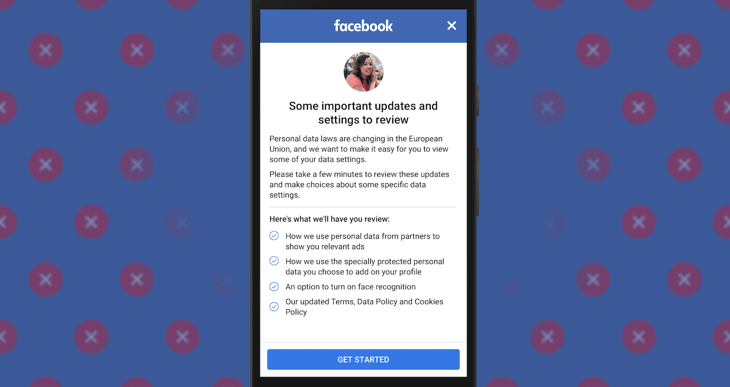Europe’s sweeping privacy law GDPR goes into effect May 25th, and Facebook is being forced to push users through new agreements to terms of service changes required to comply with the law. That’s why during today’s successful Q1 2018 earnings report call, Facebook CFO David Wehner warned that “we believe MAU or DAU might be flat or down in Q2 due to the GDPR rollout.” He also said that while Facebook doesn’t expect a significant impact on ads from GDPR, there may be a slight impact and it will be monitoring for that. Wehner notes that GDPR will impact the global online advertising industry so it may be hard to tell what the exact repercussions are for Facebook.
Wehner later clarified that’s “what we’re expecting given that you’re having to bring people through these consent flows, and we have been modeling it and expect there would be a flat to down impact on MAU and DAU.” Facebook went on to describe how if users change their ad privacy settings through the GDPR prompts to allow less targeting, ads could be less effective, so advertisers would pay less for them.
“Fundamentally we believe we can continue to build a great ads business” while continuing to protect people’s privacy, Wehner explained. He said what’s important is Facebook’s relative value to advertisers, which theoretically shouldn’t change since all ad platforms are impacted by GDPR.
Facebook unveiled its GDPR-related changes and how users will be asked to consent to them last week, and drew heavy criticism. Facebook employed “dark patterns” in the design of the consent flow, coercing users to agree to the changes without fully considering them. Meanwhile, it minimized the size and visual prominence of the buttons to revoke permissions from Facebook or reject the changes outright and terminate their account.
Facebook was likely trying to minimize the disruption to the user experience and thereby its user count with this shady design methodology. Just the fact that Wehner said Facebook has to “bring people through these consent flows” rather than describing them as giving user choice or anything about Facebook’s commitment to privacy shows that it views GDPR as merely a hurdle, not something users deserve for protection.
Read our full story on Facebook’s Q1 2018 earnings:
